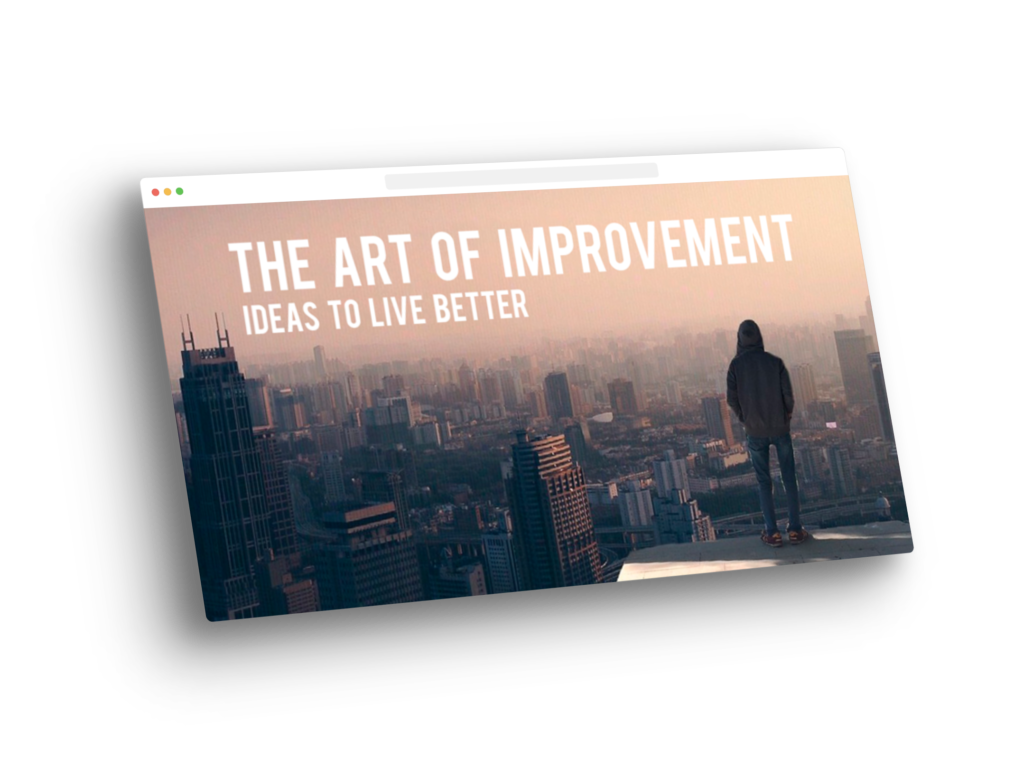Most people have goals. Personal goals, professional goals, fitness goals, and many other types of goals. Some are short term and are achieved quickly and easily. Others may take much longer. Some goals may literally take a lifetime.
We generally have goals over the course of a day or week. And can check them off our lists with little difficulty. But what about the bigger goals? Or goals we don’t really want to do in the first place? What if we have goals set for us by our boss or other obligations that we need to accomplish but just can’t seem to get to? And now it’s overdue. Time is running out and we haven’t even started. What then?
What if you’ve procrastinated too long on your goals and now you don’t even know where to start?
Define the Goal
When the time has come that you have to acknowledge the fact that you have not reached the goal you have set for yourself, it’s time to get real. Did you have a goal for your life, say five years ago and it never happened? Ask yourself if that is something you still want to do. Have you worked steadily toward the goal without much progress? Or are you starting to realize that you put it on the bottom of your list and never really got a chance to work on it?
Is it a short term goal like a work project and the deadline is looming over you to finish it now! Can you get an extension to complete it? Or drop everything else and do nothing but that until it’s done?
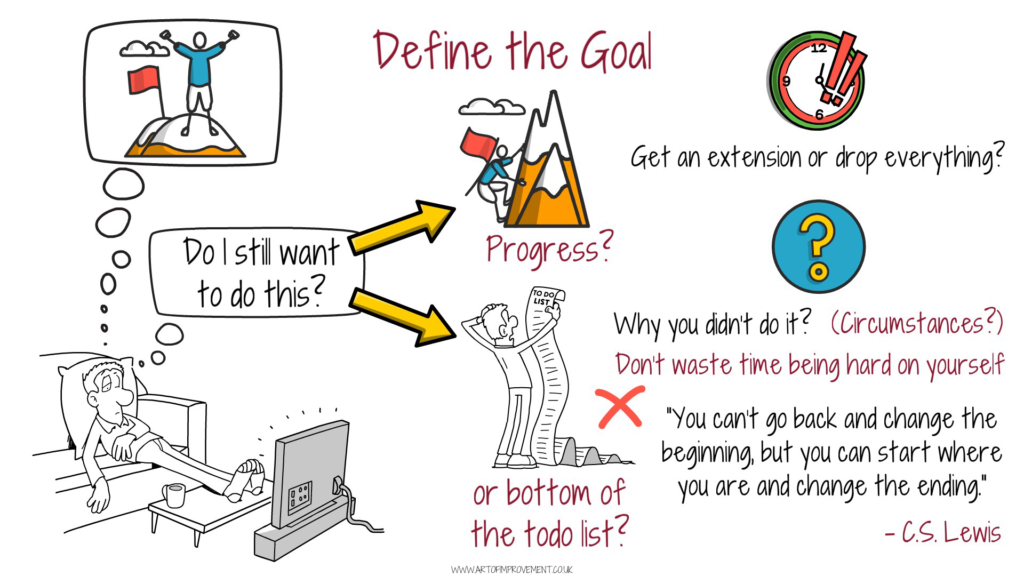
Identifying the goal and deciding if it is still possible to do it, is the first step. Then ask yourself why you didn’t do it. There may be circumstances that prevented you from getting it done. Or maybe some other reason that needs to be addressed. Don’t waste time being hard on yourself. Just start where you are now and see what you can do from this point onward. Ask yourself what would need to change for this to be possible.
Author C.S. Lewis wrote,
“You can’t go back and change the beginning, but you can start where you are and change the ending.”
Reassess Your Direction
When deciding how to begin an overdue task, you might ask yourself, “Was this important to me?” Feeling strongly about it could make it easier to schedule on your immediate “to do” list. If not, you might be putting it out of your mind altogether. Assess the importance of this goal and see if you still want or need to do it at all.
If the answer is yes, the next question you might ask yourself is, “Do I have the right skills and tools to do it?” If there is something you need to acquire to get started, then make a list. If it’s items you need, go get them! If it’s a skill or information you need, make steps to develop what you need to learn. Chinese Philosopher Lao Tzu wrote,
“A journey of a thousand miles begins with a single step.”
Sometimes you may find that the details of the task or goal are unclear. If a lack of clarity is holding you back, ask questions. Were you unsure of how to get started or proceed?
By talking to someone about the steps to take, you can gain insight on how to begin.
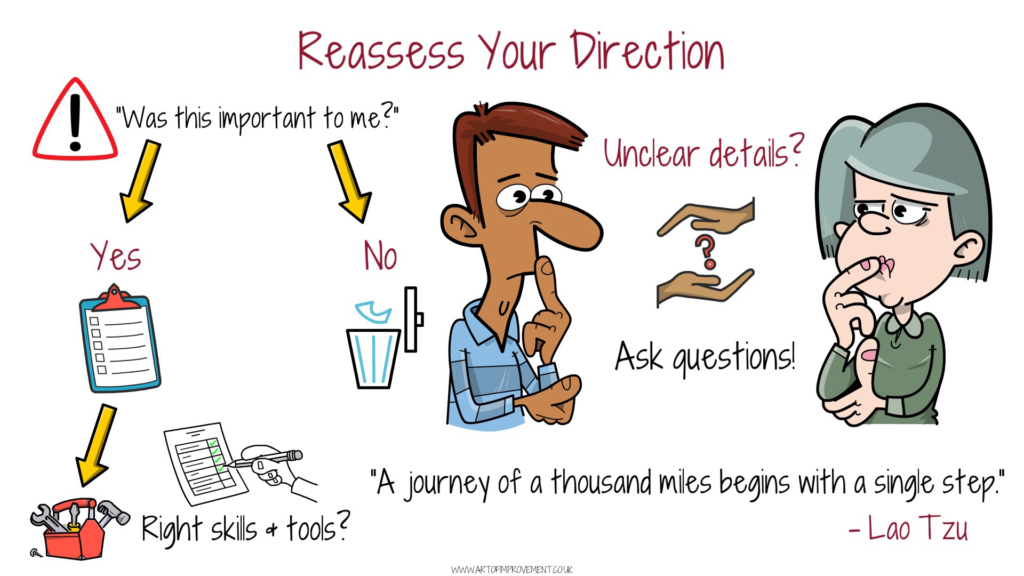
If fear of failure is the cause of your procrastination it can block you from even starting. Inventor Thomas Edison stated,
“Many of life’s failures are people who did not realize how close they were to success when they gave up.”
By letting go of your fear of the outcome, you can give yourself permission to try.
“Do not be embarrassed by your failures. Learn from them and start again.”
– Richard Branson
After you’ve assessed all of the other reasons why you haven’t reached your goal yet, check your motivation. Are there distractions keeping you from focusing on your goal? Are you disinterested in it? Ask yourself again if this is something you really want to do. If the answer is yes it may be a matter of self discipline. Greek Philosopher Epictetus said this:
“It’s so simple really: If you say you’re going to do something, do it. If you start something, finish it.”
Make a New Plan
Now that you have assessed the situation and have decided you want or need to accomplish your goal, it’s time to make a plan. Inspirational Speaker, Tony Robbins says,
“Setting goals is the first step in turning the invisible into the visible.”
There’s no need to look at the past for all the reasons or excuses you had not to do it. Coach Vince Lombardi stated,
“It’s not whether you get knocked down, it’s whether you get up.”
Start right here, right now. This is your new starting point.
Begin with prioritizing the steps you’ll need to develop a solid plan. Gathering the tools or skills you will need is a good place to start. Remember to ask for clarity if there is something standing in the way of understanding the project.
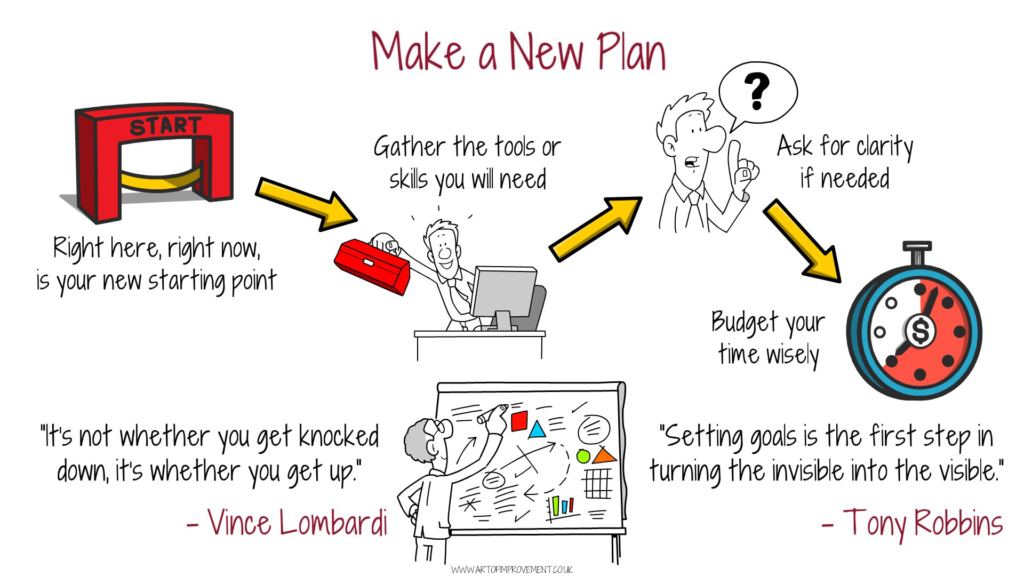
Budget your time wisely. Write out a schedule to ensure you are using your time and energy in a way that will work for you. Include your breaks and other activities you need to do along the way. By being realistic about how much time you have available to spend on your tasks, you will be more likely to stay on track.
Establish New Habits
Now that you’ve found yourself on solid ground, establish a new plan of action so you won’t continue to find yourself in the same boat again! By creating boundaries and new strategies you can be prepared to act consistently toward your future goals.
Forming a habit requires continued repetition of the desired new action, over a period of time. Make steps toward progress every day to keep the momentum going. Rewards may reinforce your efforts. Internal rewards might include feeling good about yourself, less stress, and accountability. Some examples of external rewards could be that you get paid for the job or receive some recognition for the work you’ve done.
Find mentors that can inspire and support you and make a habit of surrounding yourself with positive people. Be mindful of what you say to yourself and change any habits you’ve had about criticizing or doubting yourself. Create a new habit of positive thinking. Author David Taylor-Klaus wrote,
“Words matter. And the words that matter most are ones you say to yourself.”
Make a new habit of setting goals that are both manageable and realistic. Be clear about what you are willing and able to do. Set boundaries and know your limits but don’t be afraid to stretch your comfort zone. Create a schedule that plays to your strengths.
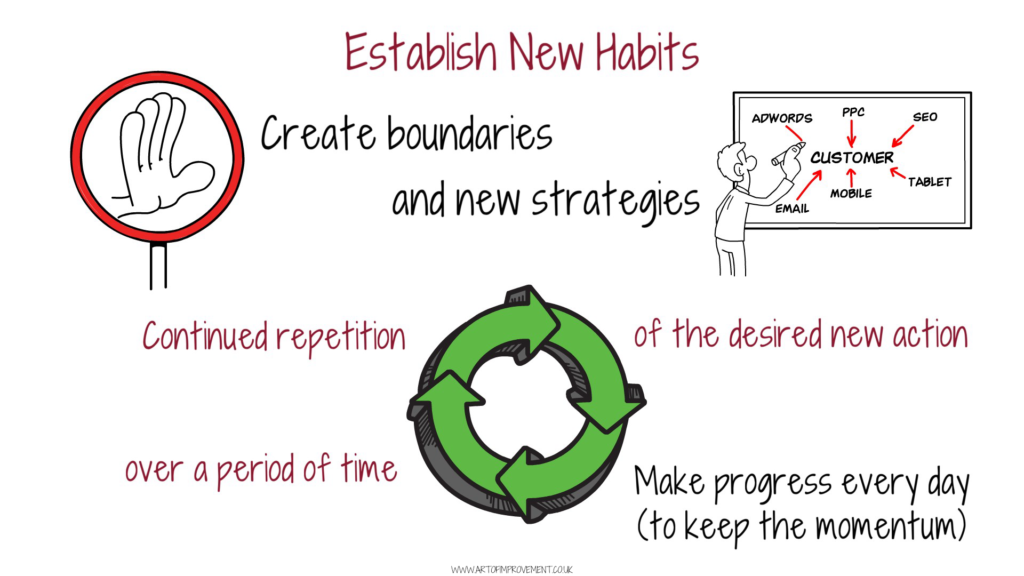
For example if you are more productive in the morning, plan to do the most difficult tasks at that time. Or if you have particular skills or talents that you can use to really make a project shine, be sure and include those.
Jim Rohn, Author of 7 Strategies for Wealth & Happiness wrote,
“Motivation is what gets you started. Habit is what keeps you going.”
Take Action
Once you’ve set your goals, made a plan, and established some positive habits, you’re ready to take action!
Become a doer by eliminating excuses and making a committed decision to accomplish your goal. Breaking your tasks down to individual steps can help you stay focused on the process without becoming overwhelmed.
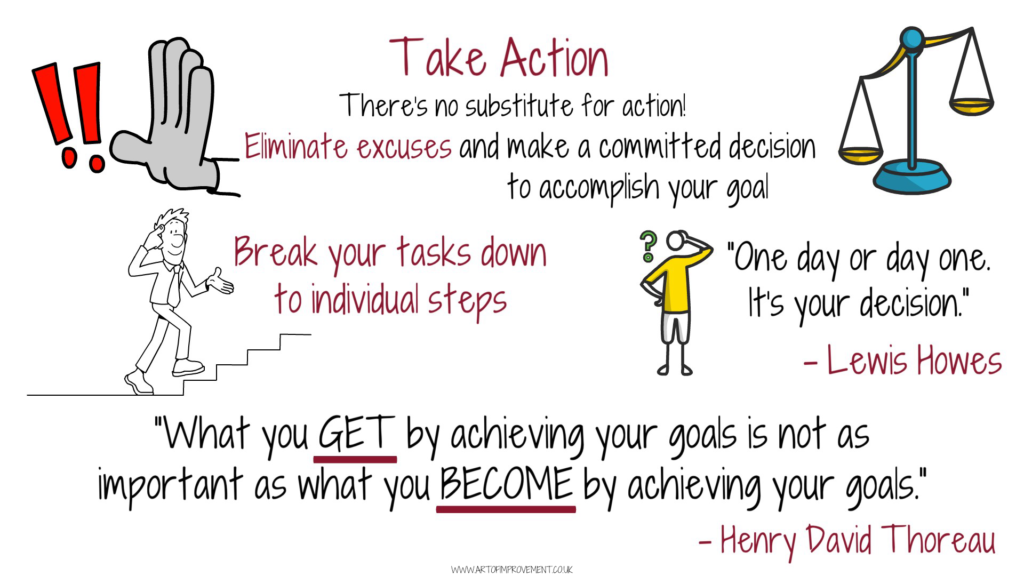
But with all of your planning, education, tools, and mentors, the bottom line is you have to find a way to get going and do it. Writer Lewis Howes said,
“One day or day one. It’s your decision.”
If you really want to achieve your goals there’s no substitute for action! And what you learn along the way might just surprise you.
Author Henry David Thoreau wrote,
“What you GET by achieving your goals is not as important as what you BECOME by achieving your goals.”
When you think about what you have to gain in terms of self development by doing the thing you need to do, you may think differently about getting started.
